2019
South Australian start-up company Prohab have been awarded Australia’s coveted Good Design Award for design excellence in the medical and scientific category, announced last week (11 July).
Designed in collaboration with Flinders University’s Associate Professor in Product Design, Sandy Walker, the Prohab Connected Healthcare Device accurately measures the force-generating capability of an individual’s muscle, in order to guide and personalise prescription of exercise and rehabilitation programs.
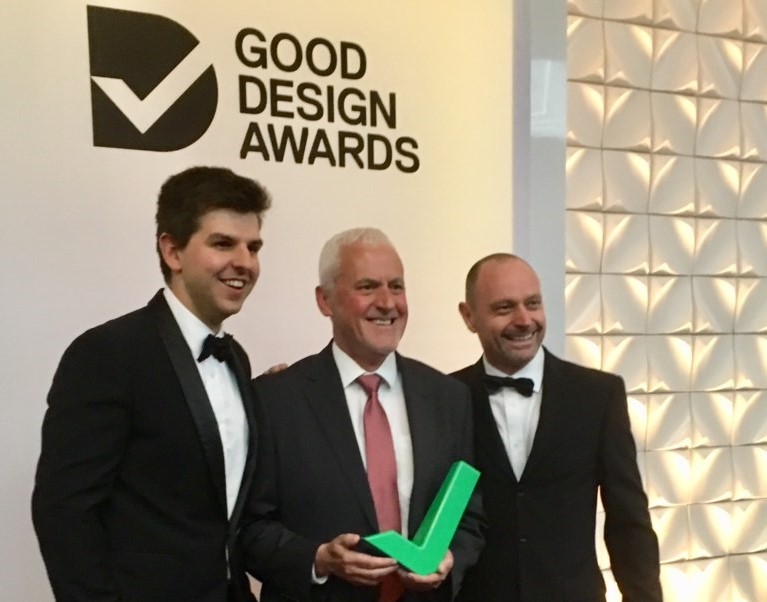
[Pictured: Associate Professor Sandy Walker, centre, with Prohab's Alex Vanderzon, left, and CEO Lyndon Huf at the awards]
Prohab CEO Mr Lyndon Huf says the device empowers the patient to be more engaged and in control of their recovery by using real time data to allow them to monitor their rehabilitation.
“The Prohab device motivates patients recovering from injury, by seamlessly gathering exercise data and keeping track of real-time progress, assisting medical professionals to make better treatment recommendations” says Mr Huf.
“The device communicates rehabilitation data in real-time addressing both the quantity of muscle intensity and volume as well as the quality of the exercises such as the control of muscle contraction”.
The winners of Australia's peak industry design awards – the highest honour for design and innovation in the country were announced at The Star on 11 July at the 61st annual Good Design Awards Ceremony.
On receiving the Good Design Award, Mr Huf says, “We are thrilled, this International recognition greatly validates our product and we are excited this timely award aligns with our next phase of investment”.
Dr. Brandon Gien, CEO of Good Design Australia says the judging panel praised the PROHAB Connected Healthcare Device commenting, “The design was extremely well resolved. Some of the detail of the physical product were excellent and inspirational in their execution (hinge, switch detention). A clever example of good design applied to an identified user need”.
Flinders University Associate Professor Sandy Walker says from their early research, they identified that “ease of clipping and unclipping” to equipment, was a key user requirement.
“Using ‘Design Think’ methods, I invented an all-in-one, strong but lightweight, titanium chassis, which combined the strain gauge, power switch and two clipping carabiners, into a single integrated component, which could then quickly and easily attached to resistance-bands and cable-based gym equipment’ said Associate Professor Walker.
“I was truly inspired by Prohab’s vision for the development of a novel rehabilitation device and have been thrilled to work on this project”, said Associate Professor Walker.
Professor Karen Reynolds, Flinders University’s Dean (Research), College of Science and Engineering and Director of the Medical Device Research Institute at Tonsley, congratulated Prohab and Associate Professor Walker on their successful collaboration.
“Flinders University is a leader in creative discovery and practical solutions, and this award is resounding acknowledgement of Associate Professors Walker’s contributions towards the development of Prohab’s device” said Professor Reynolds.
This is also a great win for South Australia.
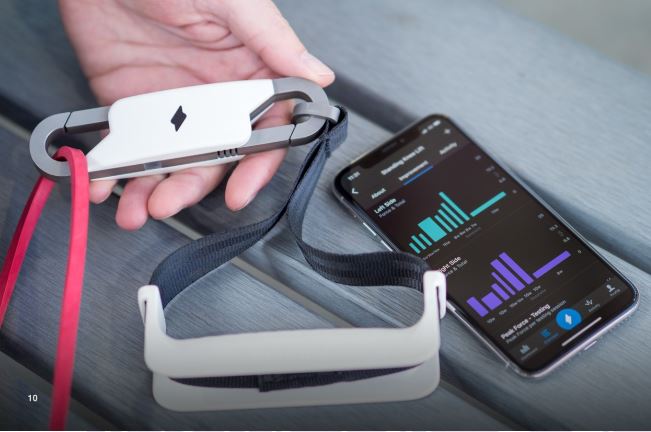
For Mr Huf, it was important to keep as much of the development in South Australia as possible.
“All the research, design, clinical trials and manufacturing for this product have remained in South Australia which is great for the sector” said Mr Huf.
Prohab (initially known as Maction) was born through Flinders University’s New Venture Institute’s Venture Dorm Program. Mr Huf then turned to the Medical Device Partnering Program to develop his first prototype of the device and was introduced to Associate Professor Walker.
Prohab have since been working to refine and test the product and recently started working with the Innovative Manufacturing Accelerator 4.0 to automate and scale manufacturing.
In 2018, Prohab were recognised with a Design Institute of Australia Premier’s Award and Gold Product award for their device, presented by the Hon. David Pisoni, South Australian Minister for Industry and Skills.
This newly announced Good Design Award has Prohab rubbing shoulders with global innovators such as Dyson, HP, Samsung, BMW and Tesla.
Based at the Tonsley Precinct, they are now working with local South Australian company to manufacture the device and are looking at investment opportunities to execute the next stages of their business.
If you are interested in learning more, visit https://www.prohab.ai/
You can view a video about the Prohab’s Connected Healthcare Device here - https://www.youtube.com/watch?v=nQ0rdn9orEo
The Medical Device Partnering Program (MDPP) celebrated a significant milestone last week (March 28), formally launching its operations in Victoria.
Officially launched by the Hon. Martin Pakula, Minister for Jobs, Innovation and Trade, this event also signified the beginning of MDPP's national expansion.
The theme of the event was partnership, with the resounding message, Many Minds Make Great Work.
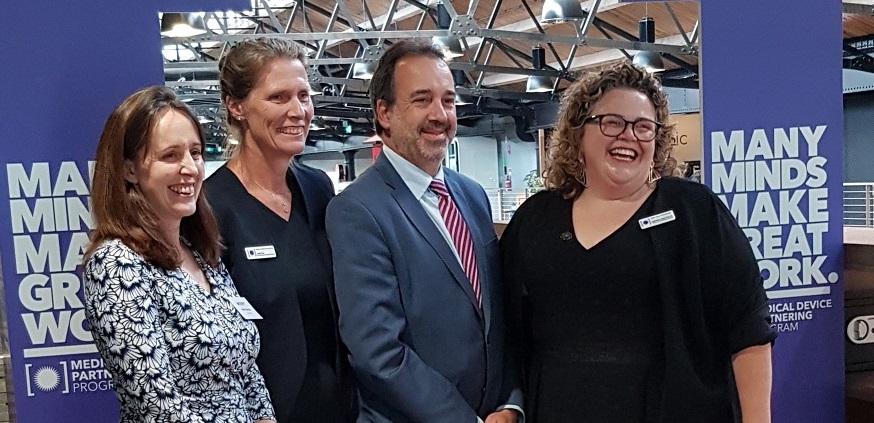
[L-R: Dr Kate Cornick (CEO LaunchVic), Professor Karen Reynolds (MDPP Director), The Hon. Martin Pakula (Minister for Jobs, Innovation and Trade Victoria), and Professor Sally McArthur (MDPP Regional Director Victoria]
MDPP Director and MC, Professor Karen Reynolds opened the event by thanking the many partners who have made national expansion possible.
Dr Kate Cornick, CEO of LaunchVic, the state government agency charged with growing the Victorian startup ecosystem, spoke about the support that they have invested to deliver the program In Victoria.
In his speech, Minister Pakula said that the MDPP is designed to add significant value to a rapidly growing medtech sector, strongly connecting university capabilities with health entrepreneurs.
"All of the institutions and organisations are absolute leaders in their field and having them all come together to support and promote medtech start-ups really promises a very exciting future for the industry" said Minister Pakula.
The Victorian MDPP partnership is led by Swinburne University of Technology and brings together CSIRO, The University of Melbourne, Monash University, RMIT University, Melbourne Centre for Nanofabrication (part of the Australian National Fabrication Facility (ANFF), and BioMedical Research Victoria, as well as three new partners who were announced on the night; St. Vincent's Hospital, Baker Institute, and La Trobe University.
It leverages the proven model and processes developed and implemented by Flinders University over 10 years, with support from the South Australian Government.
Regional Director MDPP Victoria, Professor Sally McArthur shared her excitement to lead the charge In Victoria.
"Ideas come from anywhere. But really importantly, solutions come from everywhere as well. We need to be co-creating those solutions because we’re not patients, we’re people, and we’re after healthcare not sickcare, so we need to be able to create things that are both useful and usable, and that’s really at the heart of the Medical Device Partnering Program" said Professor McArthur.
"Its about identifying the really good ideas early on and bringing a community around them to make them succeed" said Professor McArthur.
Professor Reynolds congratulated Victoria for being the first State (beyond South Australia) to embrace the MDPP, to bring together partners and the network to make it thrive.
“We are passionate about supporting the development of the medical device industry and working with a wide range of stakeholders who can achieve that” says Professor Reynolds.
"Victoria already has excellent research expertise and an entrepreneurial clinical community. The MDPP provides a platform to untap ideas, facilitate collaboration to fast track medtech development in Australia", says Professor Reynolds.
The national expansion of the MDPP has been supported by MTPConnect and the Growth Centres Initiative.
"This is just the beginning. We are working hard to realise expansion Into Queensland, New South Wales and Western Australia In the near future".
If you have an idea for a medical device or assistive technology and need research and development assistance, contact us today.
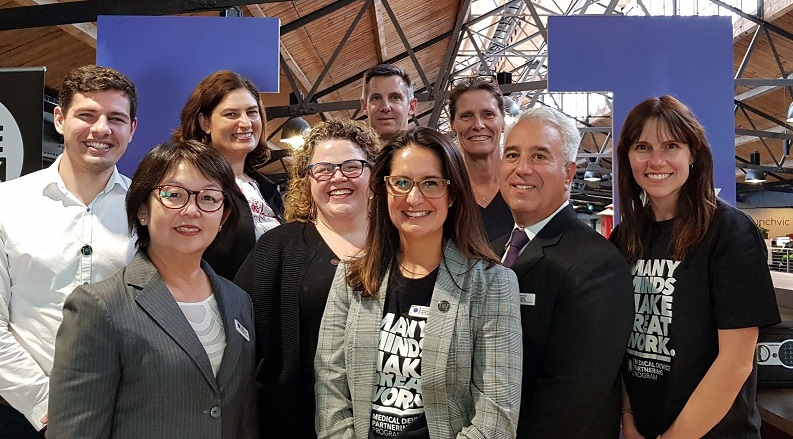
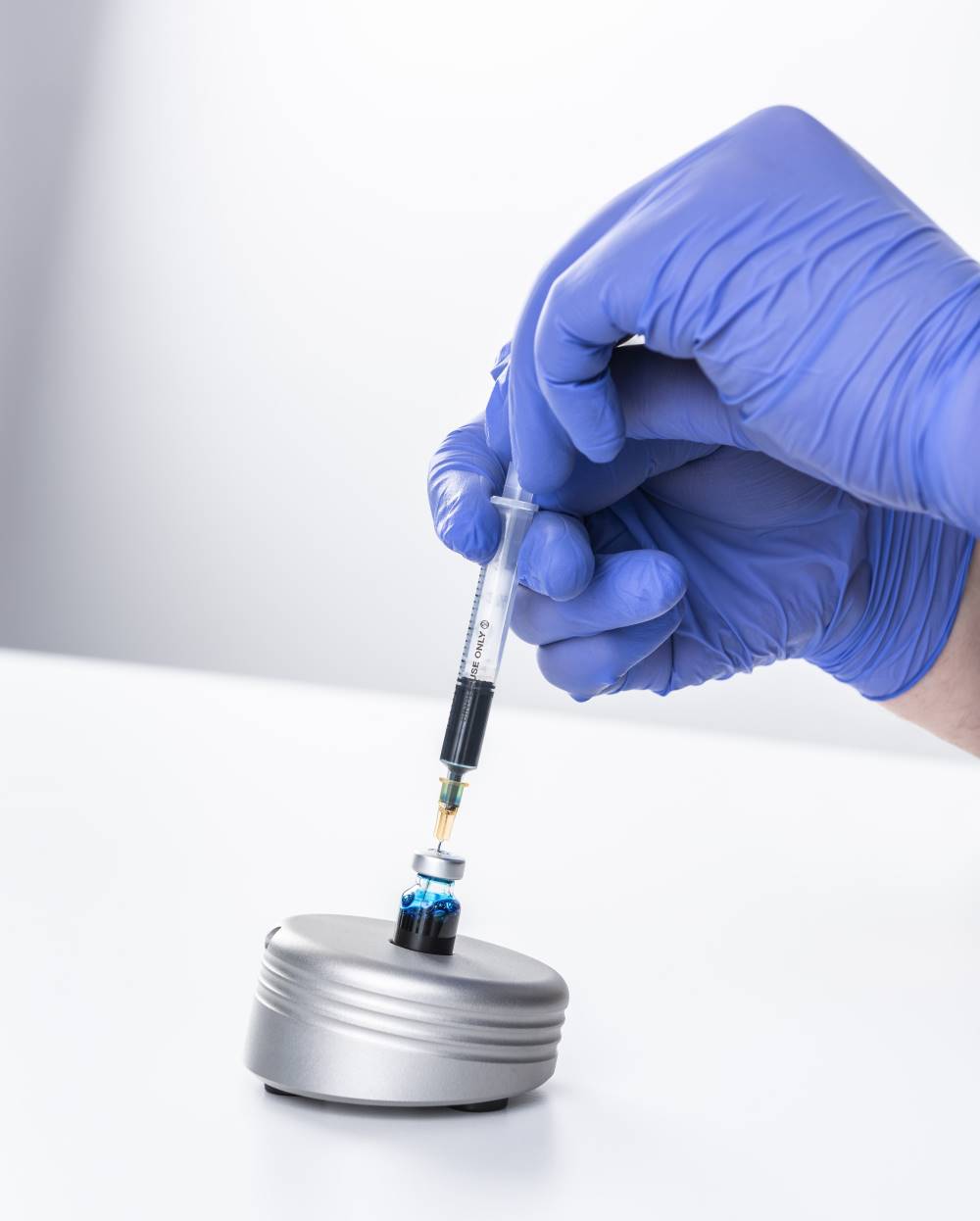
Congratulations to South Australian company AusHealth Research on their recent commercial success with their Vial Hugger product.
AusHealth (previously Medvet Science) approached the MDPP in late 2017 with their product, a medical accessory invented by South Australian ophthalmologist Weng-Onn Chan at the Royal Adelaide Hospital. The Vial Hugger device conveniently and securely holds vials into place, to reduce the risk of needle stick injury.
Whilst the product did not meet the MDPP criteria for a full project, the MDPP were able to assist the company with introductions to local manufacturers and provide feedback on their product.
Mr Greg Johansen, MD & CEO at AusHealth, said these introductions were extremely valuable.
“We took on board the feedback that the MDPP provided when commercialising this product and have now received two initial orders from Bayer and Inservio, with more orders expected in the near future” said Mr Johansen.
“The MDPP were able to connect us to the right expertise, which allowed us to get off to the best start”.
If you would like to learn more about the Vial Hugger, visit the AusHealth website.
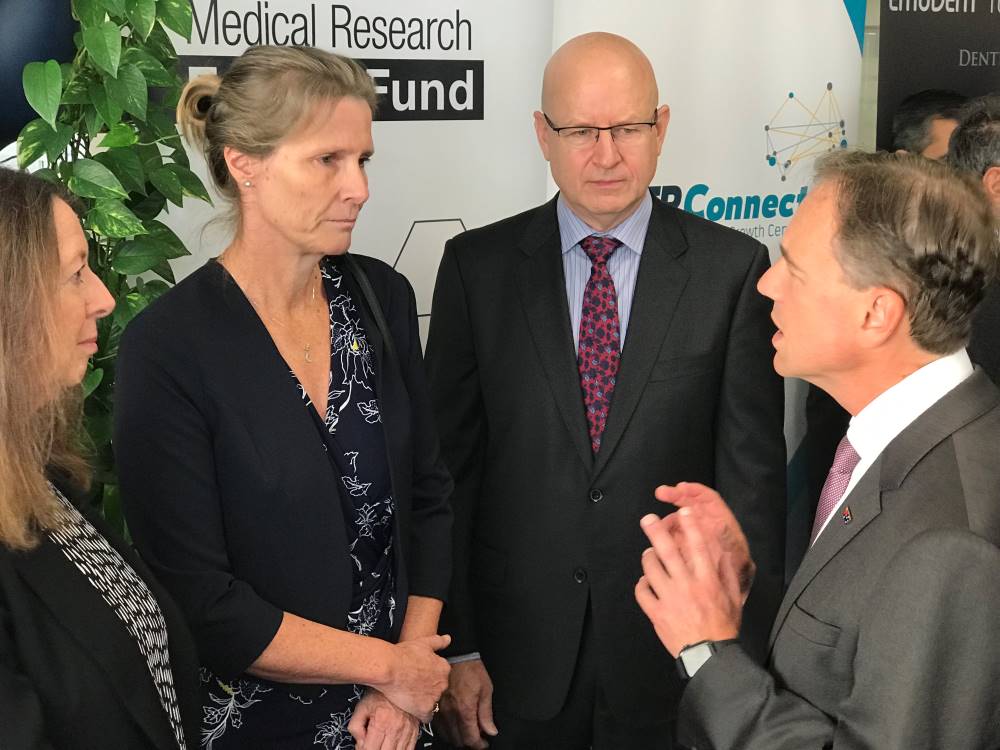
18 February 2019
The Medical Device Partnering Program (led by Flinders University) has welcomed the Federal Government’s announcement today that the Program’s partnership with MTPConnect, BioCurate and UniQuest will operate the $22.3 million Biomedical Translation Bridge (BTB) Program.
The BTB program forms part of the Federal Government’s Medical Research Future Fund and aims to help early stage health and medical research ventures reach proof-of-concept stage.
MDPP Director Professor Karen Reynolds said today’s announcement acknowledges the reputation of the Program and cements the MDPPs role as connector within the medtech sector.
"MDPP has a 10-year track record of successfully facilitating early-stage ideation and research for new medical devices. Through the BTB program we will leverage our diverse connections and expertise to optimise the success of Australia's medtech ventures," Professor Reynolds said.
Through the BTB partnership, the MDPP will assess and support eligible medical technology applications for funding, whilst BioCurate and UniQuest will together do the same for therapeutics.
MTPConnect, the Medical Technologies and Pharmaceuticals Industry Growth Centre, will administer the BTB Program.
MTPConnect CEO Dr Dan Grant said the partners bring decades of industry-based experience and an enviable track record in research translation to the program.
"By joining forces with BioCurate, UniQuest and MDPP we've created a powerful partnership venture that brings national reach, industry capabilities and expertise and commercial know-how to the task of boosting translation of Australia's healthtech research," Dr Grant said.
"Under the Biomedical Translation Bridge (BTB) program, projects for new therapies, technologies and medical devices will be eligible for up to $1 million over a period of up to three years to support translation of Australian medical research through to the proof of concept stage.
"The BTB program has a strong commercial imperative, driving development of research initiatives to improve the health of Australians that also generate commercial returns to help create the high paying jobs of the future."
"MTPConnect will also partner with the Bridge and BridgeTech programs from the Queensland University of Technology to provide opportunities for skills development to applicants, further enhancing the commercialisation advice and nurturing we can provide to BTB applicants."
Read the full MTPConnect media release here.
The Medical Device Partnering Program (MDPP) is an ideas incubator - fostering collaborations between researchers, industry, end-users and government to develop medical technologies with global market potential.
MDPP is unique in its focus and the way that it operates. It works at the very early stage, turning ideas into proven concepts. It has reliable processes and tools that enable partners to rapidly work together under low risk conditions. It is able to leverage a diverse range of expertise to contribute to product conceptualisation, including health professionals, manufacturers, engineers and service providers. The focused scale of a 250-hour project, combined with a product opportunity assessment, delivers tangible outcomes for clients.
Visit www.mdpp.org.au for more information.
The Medical Device Partnering Program (MDPP) is excited to welcome the newest members of the MDPP team, based in our new Victorian office.
Thanks to support from LaunchVic, the state government agency charged with growing the Victorian startup ecosystem, the MDPP has expanded into Victoria, with the new team based at Hawthorn.
Led by Swinburne University of Technology, the Victorian MDPP partnership brings together CSIRO, The University of Melbourne, Monash University, RMIT University, Australian National Fabrication Facility (ANFF) and BioMedical Research Victoria. It leverages the proven model and processes developed and implemented by Flinders University across 10 years.
Regional Director of the MDPP in Victoria, Professor Sally McArthur, is thrilled about the announcement of her new team.
“We have attracted some great talent to the team, each member bringing experience and knowledge that will enable us to support and build the medtech sector in Victoria”, says Professor McArthur.
“Victoria already has excellent research expertise and an entrepreneurial clinical community. With the new MDPP team now on board in Victoria, we are equipped to work together with our partners and wider network to connect stakeholders, untap ideas and rapidly progress new product opportunities in the Victorian medtech sector”.
National MDPP Director and Founder, Professor Karen Reynolds, says this significant milestone will allow the MDPP to make even more impact across Australia.
“The MDPP has been operating in South Australia for over 10 years, and over this time, has developed a proven model with outstanding results for the medtech industry. With the addition of the team in Victoria, we now have people ‘on the ground’ to benefit the State and sector in Australia more broadly”, says Professor Reynolds.
The national expansion of the MDPP has been supported by MTPConnect and the Growth Centres Initiative.
The MDPP Victoria team includes:
- Regional Director, MDPP Victoria: Professor Sally McArthur
- MDPP Innovations Manager, Victoria: Zoe Kristall
- MDPP Innovations Officer, Victoria: Brandon Piening
- MDPP R&D Manager, Victoria: Matt Richardson
- MDPP Operations Manager, Victoria: Oded VanHam
- MDPP Administration Officer, Victoria: Jen Leong
The MDPP will officially launch the Victorian node with an event to be held in the coming months.
Learn more about the team here.